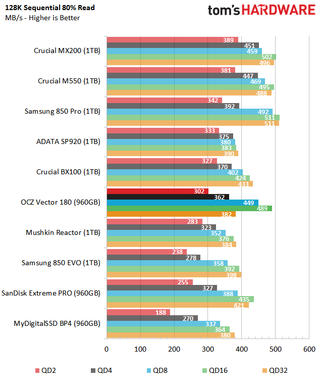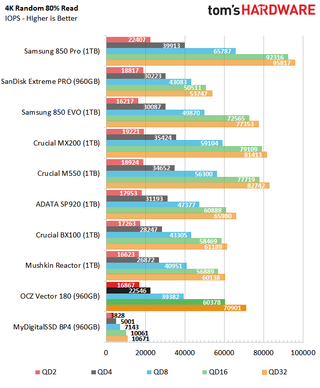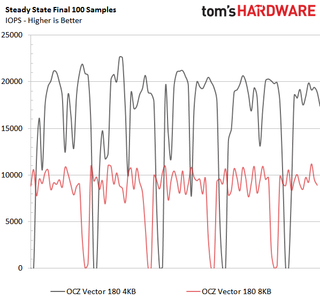OCZ Vector 180 960GB SSD Review
Why you can trust Tom's Hardware
Mixed Workload And Steady State Testing
Our mixed workload testing is described in detail here, and our steady state tests are described here.

With minimal conditioning, the Vector 180 960GB falls to the middle of the performance chart when mixing sequential reads and writes. At higher queue depths, it recovers and performs much better compared to other drives.

The 4KB mixed workload test puts the Vector 180 960GB near the bottom of the chart. We have an explanation for this, though.
Sequential Steady State Performance


This chart illustrates steady state sequential performance in 10% increments, with 100% read on the left and 100% write on the right. The Vector 180 and SanDisk Extreme Pro 960GB stand out from a number of exceptional consumer SSDs.
I want to single out the 80% read mix and plot that data. Intel states this is representative of consumer workloads, and we agree with the company's analysis. Again, the Vector 180 and Extreme Pro enjoy large leads over the competition.
Random Write Steady State Performance


This is where things start getting dicey for the Vector 180. In short, the Vector 180's buffer flush causes some issues. On the 960GB model with 1GB of DRAM, the process takes roughly two seconds if the flash writes at around 500 MB/s. When a flush occurs, it limits available bandwidth for other operations. We observed the two-second flush roughly five times every 100 seconds as we abused the drive with 4KB random writes.
Granted, you won't be peppering the drive with 4KB writes under normal conditions. When we asked about our findings, OCZ's CTO, Daryl Lang, had this to say:
“Thank you for your inquiry in regards to the I/O behavior on the Vector 180 Series. What is being observed is a characteristic of the design of the drive itself and is a result of the firmware performing updates to its metadata mapping table and flushing the entire table out of DRAM and onto the NAND flash, during which I/O throughput is impacted for very brief periods. Our metadata management is done on a frequent basis to prevent failure modes related to bricked drives as a result of metadata corruption, which can potentially happen on other non PFM+ enabled SSDs as a result of unexpected power loss. This is observed to a greater extent on the larger drives (960GB) where there is more metadata to manage. While this phenomenon is observable in synthetic benchmarks, there is virtually no impact to typical client grade end-user applications and during real world use. With the Barefoot 3 based Vector 180 Series design, we strove to deliver the optimal balance of performance and reliability for our valued enthusiast and workstation customers.”

As a follow-up, we wanted to see if the table flush was based on workload or time. So, we doubled the block size from 4KB to 8KB in an effort to lighten the table's updates. In the end, we found the system is based on the passing of time with a rate of one update every 20 seconds.
Current page: Mixed Workload And Steady State Testing
Prev Page Four-Corner Performance Testing Next Page PCMark 8 Real-World Software PerformanceStay on the Cutting Edge
Join the experts who read Tom's Hardware for the inside track on enthusiast PC tech news — and have for over 25 years. We'll send breaking news and in-depth reviews of CPUs, GPUs, AI, maker hardware and more straight to your inbox.
-
damric Now that's what I'm talking about. Adding the capacitor should keep them from having so many RMAs from loss of power/hard resets. I usually only see the capacitor added to enterprise solutions, so I'm excited to see it as a feature in consumer SSDs.Reply
THW, you need to test all SSDs with about 50 of these hard power loss cycles and see which ones become unresponsive to motherboards and bricked. -
PraxGTI Intel has been doing this on consumer drives for reliability for a long time. OCZ cuts corners. From unstable DDR3 RAM to unreliable Vertex SSDs (Red light, bricked, within weeks of initial use), I for one won't buy OCZ products anymore without big warranties and longer-term support. I have never had an issue with an Intel drive, totally worth the extra money and reliable performance.Reply -
uglyduckling81 I thought OCZ was gone. I have had 2 of their drives and never had a problem. The only reason I'm not still using my original Agility is because my laptop got stolen, but I'm sure someone is still enjoying the speed it offered. That thing cost over AU$500 for 128gb but it was worth every cent.Reply -
I have two OCZ drives, with Terabytes written to them and no problems at all. The problems seem mostly hearsay or people that don't know how to read SMART data. One has 19 TB of writes (my vertex 3 doesn't show writes, but I'd estimate it's around that or higher). Both have around 19 000 hours of heavy use.Reply
That being said, with 3d NAND available, it just doesn't make sense to purchase anything except Samsung drives these days. I'm just waiting for prices to come down, and nvme.
But OCZ is very reliable, don't drink the kool-aid. -
ykki Hopefully this move (adding the capacitor) will also encourage(force?) other players in the market to follow suit.Reply -
damric Reply15546008 said:I have two OCZ drives, with Terabytes written to them and no problems at all. The problems seem mostly hearsay or people that don't know how to read SMART data. One has 19 TB of writes (my vertex 3 doesn't show writes, but I'd estimate it's around that or higher). Both have around 19 000 hours of heavy use.
That being said, with 3d NAND available, it just doesn't make sense to purchase anything except Samsung drives these days. I'm just waiting for prices to come down, and nvme.
But OCZ is very reliable, don't drink the kool-aid.
Out of 6 of my OCZ drives, 5 of them bricked after hard reset or power loss. I was able to raise my Agility 2 back from the dead though. Since then I've learned my lesson and I don't do heavy overclocking tuning/testing/benching on SSD to minimize crashes.
I've had other SSDs with same problem. It's most common on Sandforce, but I see it happen to Indillix and Micron controllers as well. -
David Cruit Wait. Forced shut downs screw up SSDs? I overclock a lot and I've done at least 100 forced shut downs, and my SanDisk Extremes (I not II) are still working as good as ever.Reply -
Reply15546281 said:15546008 said:I have two OCZ drives, with Terabytes written to them and no problems at all. The problems seem mostly hearsay or people that don't know how to read SMART data. One has 19 TB of writes (my vertex 3 doesn't show writes, but I'd estimate it's around that or higher). Both have around 19 000 hours of heavy use.
That being said, with 3d NAND available, it just doesn't make sense to purchase anything except Samsung drives these days. I'm just waiting for prices to come down, and nvme.
But OCZ is very reliable, don't drink the kool-aid.
Out of 6 of my OCZ drives, 5 of them bricked after hard reset or power loss. I was able to raise my Agility 2 back from the dead though. Since then I've learned my lesson and I don't do heavy overclocking tuning/testing/benching on SSD to minimize crashes.
I've had other SSDs with same problem. It's most common on Sandforce, but I see it happen to Indillix and Micron controllers as well.
Sounds like BS. You have 6 OCZ SSD? Let me guess, you have 30 TB of precious data and 196GB of ram. But no UPS?
I'll admit, I've never used their agility drives, I went with Vertex both times, 3 and 4.
Sorry if I sounded harsh, it's just your bash against OCZ sounds like every other (invented) one. How many people buy 6 drives? And why buy 6 SSD drives? And you have many other SSD drives, many of which went bad, with both Indillix and Micron controllers. It doesn't make sense.
If you work for a corporation, you have UPS and redundant power supplies. If you're an individual, you can't have had so much experience with so many hard-drives. So you're a liar. Like so many a-holes online that try to discredit OCZ. Everyone I know that has used OCZ has had great experience, except for early drivers that did cause problems, mostly lost data, rarely lost drives. -
NeatOman Corsair, Samsung, Sandisk, Intel.. the rest i don't care for, not worth taking a risk if a new generation is good or not. Those companies have a great reputation of only selling SSD's that are dependable. If its in a desktop and you don't have an UPS then look for a PFM, but IMO you shouldn't half ass it as it will still lose data because it wont write what is still in the RAM. It's only $40, and should be replaced every two years.Reply -
damric Reply15546723 said:15546281 said:15546008 said:I have two OCZ drives, with Terabytes written to them and no problems at all. The problems seem mostly hearsay or people that don't know how to read SMART data. One has 19 TB of writes (my vertex 3 doesn't show writes, but I'd estimate it's around that or higher). Both have around 19 000 hours of heavy use.
That being said, with 3d NAND available, it just doesn't make sense to purchase anything except Samsung drives these days. I'm just waiting for prices to come down, and nvme.
But OCZ is very reliable, don't drink the kool-aid.
Out of 6 of my OCZ drives, 5 of them bricked after hard reset or power loss. I was able to raise my Agility 2 back from the dead though. Since then I've learned my lesson and I don't do heavy overclocking tuning/testing/benching on SSD to minimize crashes.
I've had other SSDs with same problem. It's most common on Sandforce, but I see it happen to Indillix and Micron controllers as well.
Sounds like BS. You have 6 OCZ SSD? Let me guess, you have 30 TB of precious data and 196GB of ram. But no UPS?
I'll admit, I've never used their agility drives, I went with Vertex both times, 3 and 4.
Sorry if I sounded harsh, it's just your bash against OCZ sounds like every other (invented) one. How many people buy 6 drives? And why buy 6 SSD drives? And you have many other SSD drives, many of which went bad, with both Indillix and Micron controllers. It doesn't make sense.
If you work for a corporation, you have UPS and redundant power supplies. If you're an individual, you can't have had so much experience with so many hard-drives. So you're a liar. Like so many a-holes online that try to discredit OCZ. Everyone I know that has used OCZ has had great experience, except for early drivers that did cause problems, mostly lost data, rarely lost drives.
I had an Agility 2 (failed), Agility 3 (failed), 3 Vectors (all failed) (2 came from RMA), and 1 Vector 150 (still in use), I also have a PNY Optima (first one failed), and an m500. I'm on a first name basis with the OCZ techs, btw. They always do me good when it comes to RMA, despite the fact that I broke a lot of drives. They pay for all my shipping now, and upgraded my last Vector to the 150 which is still going strong despite the fact that I haven't been all that careful with it.
I test a lot of hardware in my lab, but I'm only a small time overclocker/bencher. I really don't own that much compared to a lot of the people around here. I only have 4x entry/mid-level gaming rigs up and running right now at the house.
You can check out my HWBOT profile and see the dozens of hardware submissions I have made over the years, if you still have doubt about my credentials, or just ask the mods around here.
